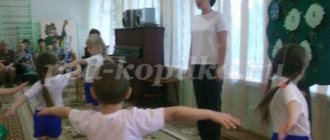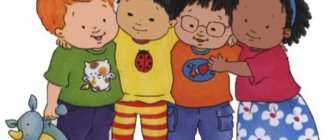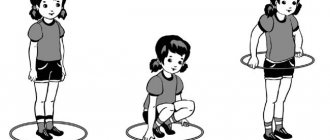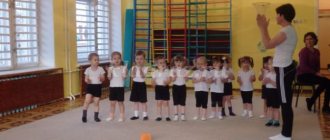Preparatory group. Senior preschool age. Children 6-7 years old
Summary of an open physical education lesson in the preparatory group - Today we will talk about our Motherland. How do you understand what the Motherland is? (Children’s answers. We live in the largest and most beautiful country on Earth! What is the name of our country? (Russia. - Like all states in the world, Russia has its own state symbols. Name them. (Flag,...
Open lesson “Me and my name” for senior preschool age Municipal budgetary educational institution of the Novosibirsk district of the Novosibirsk region - Baryshevskaya secondary school No. 9 (MBOU - Baryshevskaya secondary school No. 9)
ORGANIZED ACTIVITY WITH CHILDREN OF SENIOR PRESCHOOL AGE
“Me and my name”
NOMINATION SOCIAL-COMMUNICATIVE…
Kindergarten: does a hyperactive child need it?
It is highly desirable that a hyperdynamic preschooler attend some preschool institution. The home for a hyperdynamic child is cramped; he needs communication and other varied experiences. He is sociable, easily gets along with children and adults, active, non-offensive and enterprising. It is created for the team. Keeping it at home after three years unless absolutely necessary is completely inappropriate.
Sometimes (since, as we know, hyperdynamic syndrome is often not the only clinical manifestation of MMD - minimal brain dysfunction) parents reason like this:
“He’s so weak and nervous.” He had diathesis and stuttered, and he still pees sometimes. All sort of twitchy. Once he plays with someone and gets mad, you won’t be able to calm him down until the evening. If you send him to kindergarten, it will be even worse. It’s better for him to sit at home until school, get stronger, and then immediately go to first grade.
This reasoning is fundamentally incorrect. The fact is that a child entering any mass child care institution experiences three types of stress.
The first is immunological stress. Simply put, as many children as there are in the group (class, school) immediately begin to sneeze and cough on it. If the child's immune system is not very strong (and in children with MMD this is most often the case), it takes some time for it to adapt to the situation. This is why most children who first enter kindergarten or school begin to regularly suffer from colds. Normally, after about six months the situation levels out - the immune system has adapted to the available antigens. If a child is taken from kindergarten after the first or second illness, and sent back the next year, everything repeats all over again.
The second stress is social stress. A child who is used to being the center of attention in the family, the object of care for adults, suddenly finds himself in a situation where his wishes are not very likely to be taken into account, where everything is done on command, and other children have exactly the same rights as he himself. . If in the family where the child is growing up there are other children, his brothers and sisters, then all this passes almost painlessly. But if the child is the only one, then he faces serious problems.
In addition, only “in society” can a system of social roles be built. Who am I - a leader or a follower? What should I do if I want to make friends with this boy? What should I do if this girl took my favorite toy? How to attract the attention of other children? How, on the contrary, can you stay alone and make sure they don’t pester you? All these issues are resolved only in the practice of daily social life and nothing else.
A very socially interesting place is a kindergarten toilet, a smaller copy of a school toilet. Here very important issues are resolved, dates are arranged, relationships are sorted out. For a boy who has not gone through the “school” of the kindergarten toilet, the school toilet itself turns out to be an unexpected and often very unpleasant discovery.
The third stress is the actual school, educational stress that awaits any first-grader. Sit in one place for 45 minutes, answer only on command (even if you know the answer better than others), don’t run during recess, watch the teacher all the time, keep up with assignments, and think, think, think all the time...
So, parents who do not send their child to kindergarten, but wait at home until he “gets stronger,” doom the child to a very difficult situation when all three stresses (remember: immunological, social and educational) fall on him at the same time. And then the child either begins to get desperately sick, or one morning declares: “I won’t go to this school of yours anymore!” So what should parents do then?
So it’s better to immediately make sure that all these stresses are separated in space and time. If a child was sent to kindergarten and had his share of colds at the age of five (the immune system has adapted to constant “sneezing”), the social status is determined at the age of six (I am not a leader, but I can successfully entertain those around me, I cannot repel a direct attack , but I can easily redirect the aggression directed at me - yes, yes, don’t be surprised, it’s precisely this level of complexity that six-year-old children solve social problems), then at seven years old such a child will calmly go to school and quite successfully survive the educational situation itself.
The year before school: where to start?
And now the most important moment comes in the life of our preschooler - he is 6 years old, the last year before school. The child doesn’t care, he continues to frolic and enjoy life, but the parents are in terrible anxiety. He's going to school soon, but he also confuses the letters, and can say "three" for "one plus one", and, most importantly, he doesn't want to do anything at all, but just drives and drives his cars or watches cartoons. And he doesn’t listen about Carlson and Nils, and even for the necessary and useful program “In the World of Animals” he can’t be seated... But the neighbor’s boy already reads the fairy tales of the Brothers Grimm himself, and in a good English school across the road, during the entrance test you have to write a dictation...
What can be done to avoid this harsh stage for parents of a hyperdynamic child with the least losses and the greatest efficiency?
First of all, you need to define goals and objectives. What is important here is not only the content of the goals, but also the order in which they are arranged. Pay attention to this.
Here they are:
- Do not allow the child to develop a persistent aversion to the process of schooling even before the start of education.
- Find out what specific weaknesses there are in the child’s cognitive processes (auditory memory, logical thinking, imaginative thinking, brain-hand connection, etc.)
- Prepare your child for school and first grade.
- To form in the child a positive self-esteem and a positive attitude towards future learning.
How can all this be done?
To begin with, it is completely unacceptable to send a hyperdynamic child to school if he is not yet 7 years old at the time of admission. A child can be as intellectually developed as he likes, but psychophysically he is not yet ready for the school situation. Not right away, but it will definitely manifest itself. And then in the third or fourth quarter of first grade or at the beginning of second grade it will be too late to correct anything.
Sometimes parents say that a 6-year-old child is completely ready for school (reads, counts, writes), and for another year in kindergarten he will simply be bored. Calm down! A hyperdynamic child is never bored. He loves to play and just move. If it seems to you that he lacks educational experiences, send him to one or two “interest” clubs this year. There will be a lot of benefit and no harm. And the next year, having become physically and mentally stronger, the child will calmly and happily go to school. Of course, there are no rules without exceptions, and “Filippies” are occasionally found among hyperdynamic children, but each such case requires individual consideration and detailed consultation with a specialist.
How to choose a school and teacher?
This can be done in different ways. I’ll take the liberty of offering one of the most uncommon, but very effective.
You go to the school(s) where you plan to send your child and watch the fourth graders come out into the lobby after school ends. Among the children who ran out, you notice three or four disheveled, agile as mercury, with an open briefcase and hands smeared with ink. If at the same time they scream like crazy and speak, choking and dancing on the spot, then you can be sure that this is the hyperdynamic contingent of this class. Next, you notice which of the children you are interested in meet. Approach your mother or grandmother and say something like the following:
- Hello! Excuse me, please, my son is entering first grade next year. Perhaps it will end up with your teacher. In some ways he resembles your boy (girl). I'm very worried about him. Tell me, how did your relationship with the teacher develop these three years?
The following are possible options. If you are told a tragic story about the struggle for academic performance, notebooks and diaries dotted with red, standing in corners and scolding at parent-teacher meetings, then, regardless of the “official” reputation of this teacher, you should seriously think about it before giving your hyperdynamic child to her class.
If they tell you that there were a lot of problems, but the teacher somehow managed to find an approach to the child, always found something to praise him for, and as a result, he now makes fewer mistakes, and has become more attentive to his studies, and I always enjoy going to school—you can rest assured that this is exactly what you need.
Short stay group (STG)
As a rule, very young children from 1 to 3 years old are enrolled in the short-stay group. This service can be used by any interested parent who has submitted the necessary documents and joined the queue. Such groups work 3 times a week for 3 hours in total.
Classes there start at 8:30 and last until 11:30. There is also an evening shift from 16:00 to 19:00. It all depends on the schedule of classes at the educational institution, so always check the opening hours at your garden.
Note to parents
Most often, parents worry about at what age to send their child to kindergarten and whether it is worth doing it so early, because children from 1 to 3 years old still need their mother’s presence. It is especially difficult for parents to make a decision if this is the first baby in the family.
Staying in kindergarten is the very first and most important experience for every child. Here he learns to show his personal qualities and communicate with peers.
If we omit the details, the opinion of many experts agree on one thing: from a psychological point of view, meeting and communicating with children in a playful and relaxed manner helps the child adapt and enter society. After all, in this society the child will grow and develop, gain experience and experience different stages of personality development. And the sooner the child begins to adapt, the better it will be for his psychological health.
It should be noted that young mothers and fathers should also be prepared for such a responsible step.
And before you send your child to a short-stay group, make sure that this is exactly the place where your son or daughter will be comfortable.
Today you can quickly find reviews on the Internet about any product or service. Look for reviews and comments about your kindergarten. And you probably know mothers whose children also go to this kindergarten. You can also come to the kindergarten and see everything with your own eyes, and chat with the nannies and teachers.
What activities are conducted with children in short-stay groups?
Typically, such groups have 2 classes a week of physical education and music and once a week classes in drawing, modeling, literature and design.
It’s also not difficult to sign up for GKP groups. They are available in almost all preschool institutions. To be included in the group, you must:
- contact the head of the kindergarten with a request to enroll the child in the GKP. If there are places in the group, you will definitely be accepted;
- if there are no free places, contact the so-called “Mini-OSIP” (this is the district information support service).
- You can also sign up for the group through the city services portal
When you have found a place, you need to worry about documents for the garden. There are not many of them, but you will have to collect them quickly:
- passport of the parent or legal representative of the child;
- baby's birth certificate;
- child registration in the city;
- if you have benefits, also provide a document for inclusion in the preferential category;
Enrollment in the GKP occurs in the same way as in a regular kindergarten group. You are put on a waiting list and when a place becomes available, they call you and inform you that your child can go to kindergarten.
Procedure for enrollment in a short-stay group.
When there are few free places in a group, the head of the kindergarten must follow certain rules when enrolling a child in the group. For example, your child will be accepted faster if:
- your family (or child) lives/is registered in this area;
- preferential categories of children
If all children from this list are enrolled, then in order of priority the following are enrolled:
- children with temporary registration
- kids from other areas
A parent does not have to go to the daycare every week or month to find out if a place has become available. Typically, parents are sent an email notification or receive a call on their cell phone.
When enrolling in kindergarten, check the availability of a medical card, and immediately before enrollment you must provide:
- contacts of the child and his parents;
- complete blood count and urine test;
- analysis for enterobiasis and worm eggs
Before enrolling a child in a kindergarten group, the parent will have to sign a service agreement, which will spell out all the rights and responsibilities of both parents and teachers.
As a rule, documents of this kind protect both parties from possible claims. Therefore, every parent should not be lazy and read this agreement carefully.
Features of children staying in a short-term group
The child is not in kindergarten all day, but only for some part of the day, so meals are not provided here. But any baby can freely ask for water. So before you send your son or daughter to kindergarten, don't forget to feed him.
Adaptation in the group is quite smooth. Any parent can go to the group and see how their child feels there. This makes it easier for the baby to survive a long separation from his parents and get comfortable in a new environment. Remember also that the child’s psyche is quite vulnerable at this age, and any innovation can have a bad effect on his emotional state. But if you prepare your baby and send him to a short-term group, you can avoid negative emotions on the part of the baby.
The first days in the GKP last only half an hour for a child. Then the stay time becomes longer, but it all depends on the child’s behavior and addiction. Often educators recommend starting with half an hour and adding only 15 minutes every few days so as not to escalate the situation.
Approximate schedule for short-stay groups:
- Monday - 9:00-9:10 music games; 10:10-10:20 didactic games;
- Tuesday—10:00-10:10 movement development, 10:30-10:40—artistic creativity (drawing, modeling, appliqué, coloring must alternate here);
- Wednesday—9:00-9:10 didactic game, 10:00-10:10 speech development;
- Thursday—9:00-9:10 outdoor game; 10:00-10:10 games with building materials;
- Friday—9:10-9:20 educational game; 10:00-10:10 music game
The average monthly cost of GKP is about 1,500 rubles. However, if you have benefits, you can write an application for payment compensation (or part of the compensation).
What additional expenses does the parent expect?
Many kindergartens and groups also have additional expenses, which most often depend on the director of the kindergarten. This point should also be discussed in advance, and it is best to do this at the time of signing the contract with the garden. Although, the times when huge gatherings were held in gardens are long gone.
However, some parents face actual extortion. In this case, you should contact the anti-corruption hotline.
Junior groups for children 3-4 years old
Junior groups are open 5 days a week (Monday-Friday) from 7 am to 19:00 pm. Children aged 3 and 4 years old are enrolled in this group.
At this age, every child goes through a period of personality formation, habits and character traits are formed.
In the younger group, children get acquainted with the outside world, make new acquaintances and learn new skills. Sometimes children learn many times more in kindergarten, communicating with peers, than sitting at home with their mother.
Teachers conduct many developmental activities. This has become especially true nowadays. So children, visiting the younger group:
- recognize the world around them;
- learn correct speech;
- read fiction (in particular fairy tales and short stories);
- learn letters and numbers, get acquainted with counting;
- engaged in modeling and design;
- learn the basics of drawing and appliqué
Features of the younger group:
- at 3-4 years old, the child is already actively developing and this development is radically different from what it was in the nursery. Up to 3 years of age, children need close attention and affection, and after 3 years of age, children develop curiosity about the world around them;
- At the age of 3, children begin to show interest in group games. The child begins to become more actively acquainted with peers and communicate in society. Teachers can only help and encourage children to communicate. This is how the first independence appears.
- Many teachers and psychologists are sure that the development of children at 3 and 4 years old is the most crucial period. Let us note that it is at this age that children often suffer from colds and viral diseases when they come into contact with each other. Here you will have to be patient, because the baby’s young body is faced with many types of bacteria and viruses. But it’s a completely different matter when nannies and kindergarten teachers are negligent and the kids get sick.
- For the first time, children show their intellectual development in society. It should be noted that it is different for each baby. Some people understand faster what teachers are talking about, while others are a little slower. Here everything is in the hands of the teachers, because they must find an individual approach to each child. If you come across just such nannies and teachers, rest assured - you have chosen the right kindergarten.
- Most often, in the younger group, children acquire self-service skills: they learn to dress and undress themselves, go to the toilet and wash themselves, and even try to eat on their own;
What children learn in the younger group of kindergarten
- at this age, the child learns to dress and undress, put on and take off his shoes;
- hold cutlery and eat independently;
- they understand that they need to finish the soup and then start the second course;
- ask to use the potty, go to the toilet independently and wash their hands before and after using the toilet and playing.
Basic educational skills in the junior group:
- The child knows how to navigate around. He understands that left and right are different directions, and clothes have a front side and a back side;
- the child is oriented in the concepts of space and time. For example, a child will understand if you say: under the bed, in front of him, near the table, and so on.
- distinguishes geometric shapes: circle, square, triangle and rectangle;
- distinguishes colors;
- a child can use a model (looking at an adult) to build a pyramid from cubes of the same color, arrange objects by color;
- at this age, children strive to help adults: bring plates to the table, water or sprinkle flowers, carry a bag, etc.;
What classes are taught to children of the younger group in kindergartens?
Whatever activity the teacher conducts, it should be done in a playful way. Under no circumstances should you force your child to play or do anything. All this is necessary in order to develop a child’s interest in activities. This is how the baby develops independence and the desire to do everything as best as possible.
Features of classes in junior groups:
- At this age, the child does not yet know how to maintain concentration for a long time, therefore, classes should last no more than 15 minutes. Otherwise, you will lose the child’s attention and the baby will simply lose interest;
- At 3 years of age, the focus is on fine motor skills and motor coordination. It will be great if you allow your baby to tie his own shoelaces and fasten the buttons on his clothes;
- Children's oral speech is actively developing. Teachers read fairy tales and stories that set the child up to learn and memorize new words and phrases. It is also important to show pictures to the baby and give him the opportunity to repeat all the recently learned words;
- the child also develops his aesthetic skills through modeling and drawing;
- at the same age, physical exercises are introduced to develop flexibility, agility, endurance and speed in children;
- There is also music education, where children learn to distinguish sounds by pitch and intensity, and also become familiar with musical rhythm;
- At this time, costume performances begin to take place in the garden.







